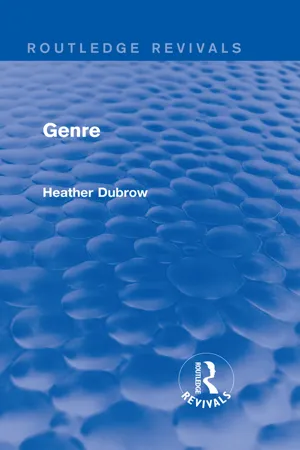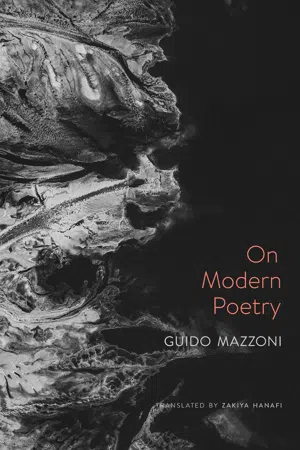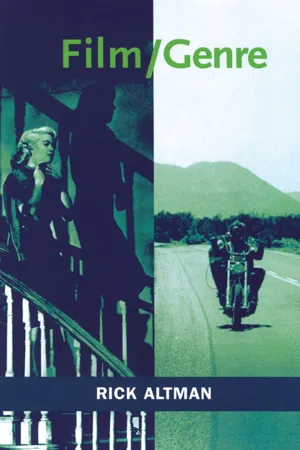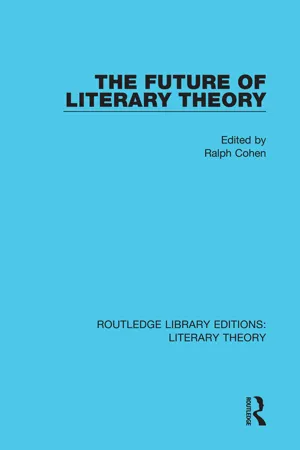Poetic Genre
Poetic genre refers to the categorization of poetry based on its form, structure, and content. Common poetic genres include sonnets, ballads, epics, and haikus, each with distinct characteristics and conventions. Understanding poetic genres helps readers and writers appreciate the diversity and nuances of poetry, and it provides a framework for analyzing and interpreting different types of poems.
5 Key excerpts on "Poetic Genre"
- eBook - ePub
- Heather Dubrow(Author)
- 2014(Publication Date)
- Routledge(Publisher)
...The term ‘mode’ is often assigned to those three literary kinds, as well as to certain others that may be said to transcend particular cultures, such as pastoral and romance; adapting the terminology of the influential German critic Karl Viëtor, some writers label such types ‘universals’. At the opposite end of the scale, certain forms appear significantly narrower than the ones that we should comfortably call genres; thus it seems sensible to apply a label like ‘sub-genre’ to such types as drawing-room comedy, the novel of manners and the country-house poem. Even after attempting to delimit the idea of genre in these ways, we are confronted with a large range of literary kinds whose claims to the title remain viable but debatable, depending as they do on exactly what we think a genre is and hence what characteristics we take into account when deciding whether to grant that label to a given literary type. Classical writers tended to emphasize meter as a determining factor. Accepting prosody as at least one determinant, most modern critics in England and America would call forms like the sonnet genres without hesitation; but other theorists, preferring to exclude metrical patterns from their consideration of genre, insist on placing types like the sonnet into a separate category, sometimes termed ‘fixed forms’. In any event, no one could claim that prosody is the sole determinant of genre in English literature. In some instances, it is subject matter that is decisive – witness the epithalamium, which is by definition a poem about a wedding, or the funeral elegy which is, of course, a poem about a death. When analyzing tragedy, Aristotle describes not only the subject matter appropriate to that genre but also the effect it should have on its audience – ‘the plot ought to be so constructed that, even without the aid of the eye, he who hears the tale told will thrill with horror and melt to pity at what takes place’ (p...
- eBook - ePub
- Guido Mazzoni, Zakiya Hanafi(Authors)
- 2022(Publication Date)
- Belknap Press(Publisher)
...CHAPTER ONE A History of Concepts Lyric and Poetry in Modern Genre Theory Between roughly 1550 and 1800, the concept of poetry underwent a profound metamorphosis, comparable in intensity to the transformation in the writing of poetry that took place between the time of Charles Baudelaire and the time of the historical avant-gardes. This change represents both the beginning of modern poetry and the necessary conditions for poetry’s entrance into the modern epoch of its history. Five centuries ago, the ideas many people use today to describe this genre were literally inexpressible. Three centuries ago, they were endorsed by only a minority of specialist readers, starting with the most significant one: that poetry corresponds for the most part with the lyric, viewed as a genre in which a first person speaks about itself in a style intended to be personal. This conflation of attributes, a foregone conclusion in the eyes of many today, rests on assumptions that are anything but to be taken for granted. The most important is a notion of the lyric that differs from the etymological meaning of the word. In ancient culture, the lyric was a poem sung to the sound of a lyre. By metonymy, it was a poem intended to be read silently but whose subject matters and meters drew on the tradition of poetry accompanied by string instruments. In our culture, the lyric is one of the three major theoretical families into which literature is divided. It groups together texts in which a first-person speaker expresses content considered to be personal: individual passions, states of mind, reflections. This modern concept has an origin and a history: it is actually contemporary to the division of literature into three theoretical groupings that emerged around 1550 and became established between approximately 1750 and 1850...
...The move that is tentatively made by the Hellenistic critics is to transform the three modes of presentation of speech (authorial, figural, and mixed) into three genres ; this is the term (genera) used by Diomedes in the late fourth century. From the late Renaissance – Irene Behrens (1940) notes its occurrence in Minturno’s essay De Poeta (1559), and there are later references in Cervantes, Milton, and Dryden – the third ‘genre’ is designated as the lyric, and the now-familiar triad of the epic, dramatic, and lyrical starts to become conventional currency. The attraction of this schema is clear: it is comprehensive, covering the major areas of imaginative writing, although on closer examination it turns out that there are some important exclusions; it allows for an exhaustive differentiation of these areas; and it allows for conceptually elegant philosophising about the relations between writing and human experience. When Friedrich Schlegel complained in 1797 that ‘[w]e already have so many theories about Poetic Genres. Why have we no concept of Poetic Genre?’ (Schlegel 1957), it was to this lack of what David Duff (2000 : 3) calls ‘a philosophical theory of genre, as distinct from a purely descriptive account of individual genres’, that he was calling attention. Yet these three forms, the epic, the dramatic, the lyrical, which are adjectival in nature rather than nominal, are larger than the individual genres, which they contain. Goethe thus distinguishes, in two of the notes appended in 1819 to the Westöstlicher Divan, between the multiplicity of genres proper or Dichtarten (allegory, ballad, drama, elegy, epistle, fable, idyll, ode, novel, parody, romance, satire …), with their heterogeneous criteria, and the three ‘natural forms’, the drei echte Naturformen der Dichtung : the epic mode of lucid and detached narration, the lyric mode of enthusiastic excitement, and the dramatic mode of personal action (Goethe 1966 : 480)...
- eBook - ePub
- Rick Altman(Author)
- 2019(Publication Date)
- British Film Institute(Publisher)
...Yet, quietly, the genre theories of the past have nevertheless set certain standards that continue tacitly to underlie recent attempts to theorize genre. If this chapter contains many of the familiar names of generic thinking, it is not, however, simply to rehearse what these thinkers have said about genre. In other words, what follows is in no sense a history of literary genre theory. Rather, in the hope of discovering the origins of our own blindness, the purpose here is to highlight the very claims that genre theorists have failed to recognize they were making, the constitutive assumptions that theoreticians have neglected to acknowledge in their own work, the habits and positions that have been silently passed on, often at cross-purposes with official positions and conscious claims. Classical genre theory ‘I propose to treat of poetry in itself and of its various kinds, noting the essential quality of each’, says Aristotle at the outset of Poetics. Epic poetry and tragedy, comedy also and dithyrambic poetry, and the music of the flute and of the lyre in most of their forms, are all in their general conception modes of imitation. They differ, however, from one another in three respects – the medium, the objects, the manner or mode of imitation, being in each case distinct. Certainly, one of the most attractive features of Aristotle’s famous treatise – and one of the sources of its continued influence – is the clarity, indeed the apparently incontrovertible simplicity, with which every claim is made. Everything is straightforward. Or rather, as with all great rhetoricians, every claim is made to seem straightforward. In fact, every one of Aristotle’s apparently transparent expressions conceals a set of assumptions tacitly adopted by virtually every subsequent genre theorist...
- eBook - ePub
- Ralph Cohen, Ralph Cohen(Authors)
- 2016(Publication Date)
- Routledge(Publisher)
...We can find an indication of it in the fact that intergeneric classification remains purely enumerative; even if the classical era accepts a hierarchy among the main genres (epic, drama, comedy) and the lesser genres (ode, elegy, sonnet, fable, etc.), this hierarchy is purely axiological and does not lead to a global logical structuration or to a system. It stands to reason that the idea according to which the genres would be the prime mover of literature capable of being used as the explanation for the existence of individual texts, is beyond the horizon of classical thought; genre is not an explanatory notion but a criterion of critical discrimination. The functioning of generic definitions as critical criteria is tied closely to the general conception of literature that was maintained in the classical age: it is conceived essentially as the field of attempts, ever repeating, of the imitation of ideal models. That the models are ancient is only a contingent trait, since it is not shared by all classical poetics; but that poetry is the field of imitation and emulation is an idea that the defenders of the Ancients and those of the Moderns shared alike. The generic theory, then, is indissociable from a problematic of imitation, not so much of exemplary texts as of stable rules abstracted from such texts. This means that it is basically pragmatic, directed toward poetic activity to come; all of the descriptions can be translated into prescriptive propositions. Contrary to a received idea, the classical theories, even when they admit the paradigmatic value of the Ancients, are therefore always turned toward the future, what is of consequence to them is the normative value of the generic models for subsequent literary activity. A radical change in conception occurred toward the end of the 18th century; henceforth literary theory would no longer be conceived as a descriptive and/or normative activity but as a speculative, interpretive undertaking...




